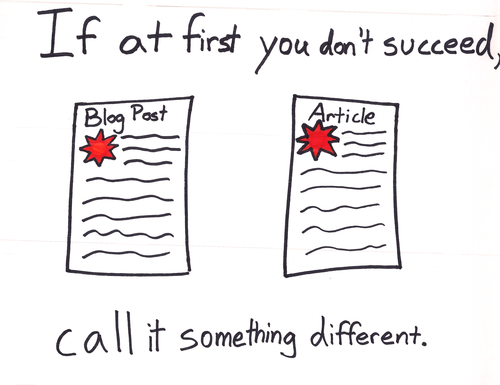
I suck at writing headlines. It takes me forever to summarize my posts in a few words. The headlines I usually come up with have little or no SEO value. My only redeeming factor is that the titles I do come up with are often funny and memorable.
With my weaknesses in mind, I began an experiment recently using The Anti-Social Media’s Twitter. I’m sorry I didn’t tell you, but it was more fun scientific that way. With that in mind, let’s break down this experiment 6th grade scientific method style.
Hypothesis: I believe I am a crappy headline writer. I intend to prove this realization by posting the same article on Twitter twice in the same day with different headlines to see what gets more page views.
Method: I posted my articles to Twitter using the original headline in the morning around 9 am EST. In the afternoon, I’d post under a different headline. As a control, I’d reposted some articles using the original headline.
Results: Results were varied. One post spread rapidly under the the different title. Other posts stayed relatively the same as others. All pages that were reposted to Twitter had more views than if they had only been posted once.
Conclusion: I’m not sure if I proved I am a crappy headline writer from this experiment. All of the posts that were reposted got more views, regardless of headline. This increase may be a result of people not seeing the original posts in the morning, especially for my readers in different timezones than me.
Besides one post, different headlines didn’t seem to have a huge effect. I’m just going to trust my instincts on this one for now and keep using my original titles. Hopefully I’ll get better at titling as I keep writing more.
Overall though, posting just once didn’t seem to be enough, so clearly putting the same thing out there twice is worthwhile. If that’s the case, how can I repost an article without alienating my followers. The last thing I want to do is make my followers feel like I’m spreading the same content over and over. Here are some ground rules I came up with.
- Only promote and repost the article on the day that I published it. If it doesn’t catch on today, it’s not going to catch on tomorrow.
- Separate the new posts from the reposts with the tag “New Post!” in front. This gives readers a visual cue as to what is new content.
- If the readers and followers start complain incessantly, quit reposting. You’ve got bigger fish to fry.
I want to know if you’ve experimented with reposting articles on Twitter. Was it successful? Was it sexy? Was it a complete failure? Let me know how your science project turns out.











